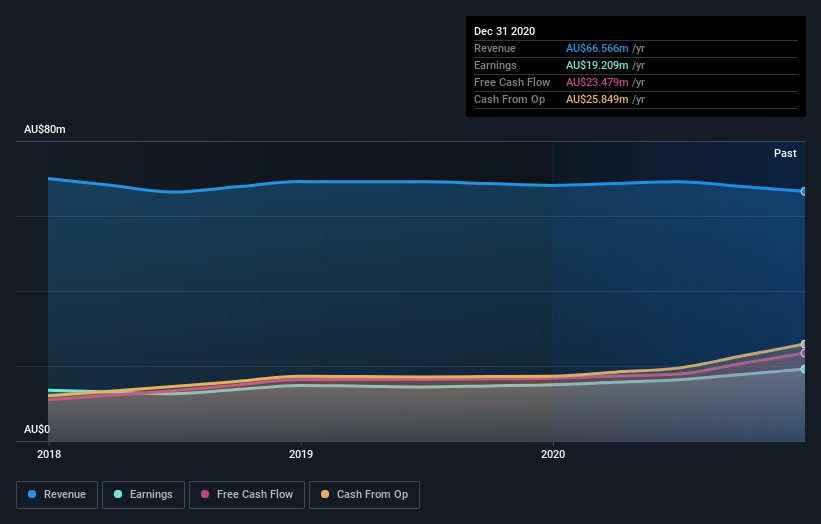What Kind Of Shareholders Hold The Majority In FSA Group Limited's (ASX:FSA) Shares?
The big shareholder groups in FSA Group Limited (ASX:FSA) have power over the company. Institutions often own shares in more established companies, while it's not unusual to see insiders own a fair bit of smaller companies. I generally like to see some degree of insider ownership, even if only a little. As Nassim Nicholas Taleb said, 'Don’t tell me what you think, tell me what you have in your portfolio.
FSA Group is a smaller company with a market capitalization of AU$135m, so it may still be flying under the radar of many institutional investors. In the chart below, we can see that institutions don't own many shares in the company. We can zoom in on the different ownership groups, to learn more about FSA Group.
See our latest analysis for FSA Group
What Does The Institutional Ownership Tell Us About FSA Group?
Institutional investors commonly compare their own returns to the returns of a commonly followed index. So they generally do consider buying larger companies that are included in the relevant benchmark index.
Institutions have a very small stake in FSA Group. That indicates that the company is on the radar of some funds, but it isn't particularly popular with professional investors at the moment. If the company is growing earnings, that may indicate that it is just beginning to catch the attention of these deep-pocketed investors. When multiple institutional investors want to buy shares, we often see a rising share price. The past revenue trajectory (shown below) can be an indication of future growth, but there are no guarantees.
We note that hedge funds don't have a meaningful investment in FSA Group. Because actions speak louder than words, we consider it a good sign when insiders own a significant stake in a company. In FSA Group's case, its Senior Key Executive, Tim Maher, is the largest shareholder, holding 21% of shares outstanding. For context, the second largest shareholder holds about 13% of the shares outstanding, followed by an ownership of 10% by the third-largest shareholder. Interestingly, the third-largest shareholder, Deborah Southon is also a Member of the Board of Directors, again, indicating strong insider ownership amongst the company's top shareholders.
On looking further, we found that 54% of the shares are owned by the top 4 shareholders. In other words, these shareholders have a meaningful say in the decisions of the company.
While studying institutional ownership for a company can add value to your research, it is also a good practice to research analyst recommendations to get a deeper understand of a stock's expected performance. As far I can tell there isn't analyst coverage of the company, so it is probably flying under the radar.
Insider Ownership Of FSA Group
The definition of an insider can differ slightly between different countries, but members of the board of directors always count. Management ultimately answers to the board. However, it is not uncommon for managers to be executive board members, especially if they are a founder or the CEO.
Most consider insider ownership a positive because it can indicate the board is well aligned with other shareholders. However, on some occasions too much power is concentrated within this group.
Our most recent data indicates that insiders own a reasonable proportion of FSA Group Limited. Insiders have a AU$47m stake in this AU$135m business. I would say this shows alignment with shareholders, but it is worth noting that the company is still quite small; some insiders may have founded the business. You can click here to see if those insiders have been buying or selling.
General Public Ownership
With a 34% ownership, the general public have some degree of sway over FSA Group. While this group can't necessarily call the shots, it can certainly have a real influence on how the company is run.
Private Company Ownership
We can see that Private Companies own 27%, of the shares on issue. It's hard to draw any conclusions from this fact alone, so its worth looking into who owns those private companies. Sometimes insiders or other related parties have an interest in shares in a public company through a separate private company.
Next Steps:
It's always worth thinking about the different groups who own shares in a company. But to understand FSA Group better, we need to consider many other factors. To that end, you should learn about the 2 warning signs we've spotted with FSA Group (including 1 which shouldn't be ignored) .
If you would prefer check out another company -- one with potentially superior financials -- then do not miss this free list of interesting companies, backed by strong financial data.
NB: Figures in this article are calculated using data from the last twelve months, which refer to the 12-month period ending on the last date of the month the financial statement is dated. This may not be consistent with full year annual report figures.
This article by Simply Wall St is general in nature. It does not constitute a recommendation to buy or sell any stock, and does not take account of your objectives, or your financial situation. We aim to bring you long-term focused analysis driven by fundamental data. Note that our analysis may not factor in the latest price-sensitive company announcements or qualitative material. Simply Wall St has no position in any stocks mentioned.
Have feedback on this article? Concerned about the content? Get in touch with us directly. Alternatively, email editorial-team (at) simplywallst.com.

 Yahoo Finance
Yahoo Finance 

